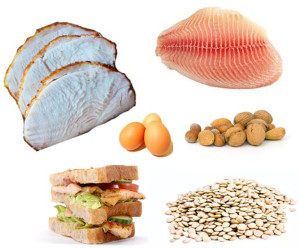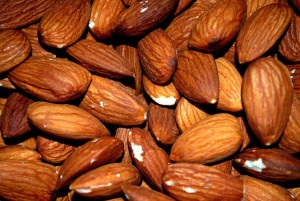When embarking on a new fitness goal one of the most challenging components is knowing what to eat, how often and how much. It’s easy to get overwhelmed by the many conflicting recommendations and determining where to begin. A great place to start is simply with understanding the building blocks of nutrition – macronutrients.
Each macronutrient – protein, carbohydrates, fat – is an energy source, however, each plays a different role in our body. Knowing how to balance the macros to better align with your fitness goals will help you make more informed choices when deciding what to eat. Regardless of your fitness goals, in order to keep your body functioning optimally, a balanced diet which includes each of the three macros is needed each day. Here’s a quick overview of each one and how your body uses it.
Protein
 Protein is probably the most highly regarded macro of the fitness-minded for its ability to help rebuild muscle, however, protein provides many other functions within the body. Proteins provide structure to bones, teeth and skin, transports nutrients and other compounds throughout the body and helps maintain fluid and acid balance. Proteins are made up of molecular structures called amino acids. While our bodies can make some amino acids (non-essential), it cannot make other amino acids (essential) and must obtain them from food stuff.
Protein is probably the most highly regarded macro of the fitness-minded for its ability to help rebuild muscle, however, protein provides many other functions within the body. Proteins provide structure to bones, teeth and skin, transports nutrients and other compounds throughout the body and helps maintain fluid and acid balance. Proteins are made up of molecular structures called amino acids. While our bodies can make some amino acids (non-essential), it cannot make other amino acids (essential) and must obtain them from food stuff.
Following an intense resistance training session, the rate at which protein is made and broken down is elevated for a 24-48 hour period. Eating sufficient protein will aid in the repair of muscle fibers damaged during exercise as well as promote adaptations (think GAINS!)
Protein can be found in many foods including lean meats and seafood such as poultry, beef and fish as well as many dairy products like cheese, yogurt and cottage cheese. For non-meat eaters consider foods such as tofu, hummus, legumes, seeds and nuts. When in a pinch, all types of eaters can benefit from keeping a decent protein powder or protein bar on hand for unexpected delays between meal times.
Carbohydrates
 Surprisingly, many of the same fitness-minded folks who hold protein so high, don’t do the same for carbs. While carbs are often regarded as something that should be avoided, they are actually our body’s first choice for energy. Like protein, carbs play an important role in the everyday functioning of our bodies, including the brain and central nervous system.
Surprisingly, many of the same fitness-minded folks who hold protein so high, don’t do the same for carbs. While carbs are often regarded as something that should be avoided, they are actually our body’s first choice for energy. Like protein, carbs play an important role in the everyday functioning of our bodies, including the brain and central nervous system.
Carbs are the preferred fuel source of the body and are also muscle sparing, meaning that when carbs are not restricted, the body is less likely to turn to other sources for energy. Different carbs are often labeled as good or bad, which can lead to unnecessary food restrictions and even outright fear of consumption. A better way to think of carbs is as simple or fast-digesting or slower-digesting, complex carbs. Neither is good or bad and both have a place in your diet. Slower digesting carbs like vegetables, beans and whole grains provide our bodies with fiber, satiety and help maintain blood sugar and energy levels. These carbs should be prioritized in your diet.
Faster digesting carbs like refined grains such as processed cereals, white pastas, white rice and foods with added sugars are best consumed around your training when your energy stores are low and you want to refuel.
Fats
 Another macronutrient that has received a bad rap over the years are fats. Fats, like the other macronutrients, are essential to maintaining healthy body function. They provide energy, form cell membranes, aid in the transport of fat-soluble vitamins and help with the manufacture and balance of hormones. Our brains are comprised mostly of fat and as you might have guessed, fat also provides cushioning to our organs. Bottom line, they are needed so don’t avoid them!
Another macronutrient that has received a bad rap over the years are fats. Fats, like the other macronutrients, are essential to maintaining healthy body function. They provide energy, form cell membranes, aid in the transport of fat-soluble vitamins and help with the manufacture and balance of hormones. Our brains are comprised mostly of fat and as you might have guessed, fat also provides cushioning to our organs. Bottom line, they are needed so don’t avoid them!
There are several types of fat from saturated to unsaturated to trans. With the exception of trans fats, which should be avoided, eat a balance of the remaining fats. The easiest way to do that is to eat a variety of fats with an emphasis on omega-3 fats, which are usually in the low end unless you eat a lot of fish or take supplements. In your diet include olive oil, salmon, walnuts, and fish oil.
As you can see, each macronutrient has an important function to the body. Eliminating or severely restricting any can have a negative impact on bodily functions as well as your fitness goals.
Discover more from Eat More 2 Weigh Less
Subscribe to get the latest posts sent to your email.








Excellent information! Thanks Trish!
such a good post! i have been sharing this information with a lot of people on fatsecret (the calorie tracker i use). it saddens me to see people posting journal entries of eating hardly anything and then not understanding why they arent losing weight. i try to share as much information as i can that i have learned from here and point them to the website for more. But then its up to them to take action, read it and try to change the way of thinking and misinformation we have been fed for so long.
Keep spreading the word Nina! Hopefully, they will start to listen to the message. You hit the nail on the head. With all the misinformation in the media, it’s very hard for us to believe that the opposite message may actually be the solution. Thanks for your comment!